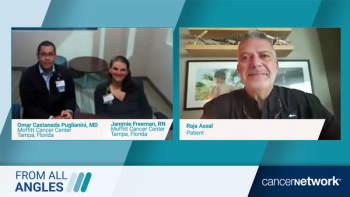CAR T-Cell Therapy in Multiple Myeloma

Panelists discuss how the patient’s journey with multiple myeloma begins with an initial diagnosis followed by first-line treatments and how this informs the decision to consider chimeric antigen receptor T-cell therapy as a subsequent option in their treatment path.

Panelists discuss how the patient’s journey with multiple myeloma begins with an initial diagnosis followed by first-line treatments and how this informs the decision to consider chimeric antigen receptor T-cell therapy as a subsequent option in their treatment path.

Panelists discuss the rationale for considering chimeric antigen receptor (CAR) T-cell therapy in standard-risk multiple myeloma and how health care providers help patients understand and prepare for the decision to pursue CAR T-cell treatment.

Panelists discuss the chimeric antigen receptor (CAR) T-cell collection, manufacturing, and infusion process, highlighting how it differs from previous treatments, and share the challenges faced during CAR T-cell therapy, including managing adverse effects.

Panelists discuss the key considerations in preparing patients for chimeric antigen receptor (CAR) T-cell therapy and how the treatment process differs when CAR T-cell therapy is used in earlier vs later stages of multiple myeloma.

Panelists discuss how to monitor and manage adverse effects, particularly chimeric antigen receptor (CAR) T cell–specific reactions, in patients receiving this therapy and how to collaborate with the CAR T-cell therapy team during the treatment phase, emphasizing the most critical aspects of patient care at this stage.

Panelists discuss how patients’ lives change after receiving chimeric antigen receptor (CAR) T-cell therapy, comparing the recovery process to previous lines of therapy, and how overall quality of life improves or changes following CAR T-cell treatment.

Panelists discuss the protocol for long-term monitoring of patients who receive chimeric antigen receptor (CAR) T-cell therapy, focusing on relapse prevention and overall health, as well as the impact of CAR T-cell therapy on long-term management of patients with standard-risk disease, including additional steps to monitor disease progression and ongoing support in the months and years following treatment.

Panelists discuss advice for patients with myeloma considering chimeric antigen receptor T-cell therapy, drawing from their experiences to guide patients through the decision-making process and expectations for the treatment journey.

Panelists discuss the evolving role of chimeric antigen receptor T-cell therapy in earlier lines of treatment for multiple myeloma, with a focus on upcoming advances for patients with standard-risk disease and the impact of multidisciplinary collaboration on improving patient care and outcomes.


